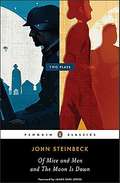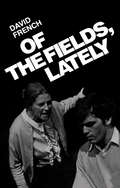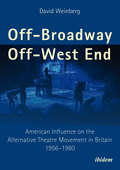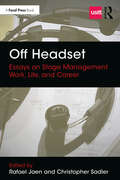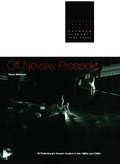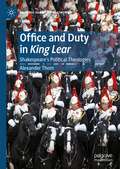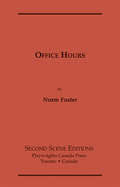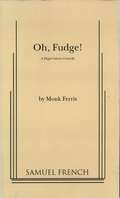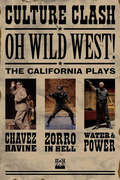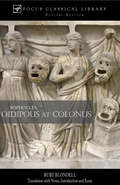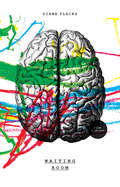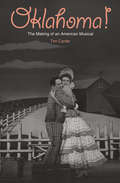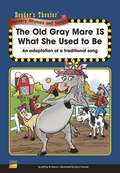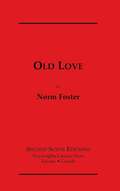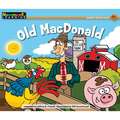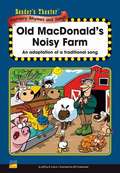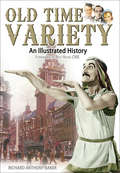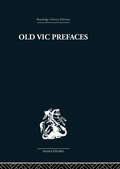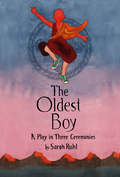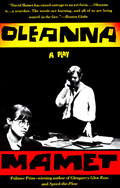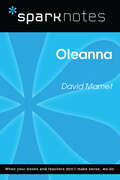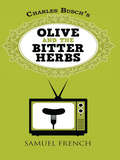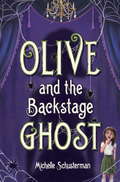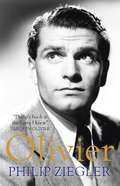- Table View
- List View
Of Mice and Men and The Moon Is Down
by John SteinbeckThis Penguin Classics edition celebrates Steinbeck’s dramatic adaptations of his most powerful short novels, Of Mice and Men and The Moon Is Down, featuring a foreword by award-winning actor James Earl Jones. Of Mice and Men represents an experiment in form, as Steinbeck put it, "a kind of playable novel, written in novel form but so scened and set that it can be played as it stands. ” A rarity in American letters, it achieved remarkable success as a novel, a Broadway play, and three acclaimed films. Of Mice and Men received the New York Drama Critics’ Circle Award for Best Play in 1937-1938. A number of acclaimed actors have interpreted the iconic roles of George and Lennie for stage and screen, including James Earl Jones, John Malkovich and Gary Sinise. The Moon Is Down uncovers profound, often unsettling truths about war and human nature. It tells the story of a peaceable town taken by enemy troops, and had an extraordinary impact as Allied propaganda in Nazi-occupied Europe. This Penguin Classics edition of the theatrical adaptations of Steinbeck’s two classic short novels are essential to actors, playwrights, filmmakers and directors studying the dramatic work of the Nobel Prize winning author of The Grapes of Wrath and East of Eden. .
Of the Fields, Lately
by David FrenchA son returns after an absence of two years to find both his mother and family friend Wiff trying to sustain his father, Jacob. A heart attack has forced Jacob out of work, and he can't reconcile himself to his frightening situation. The characters all discover something about themselves under this pressure of imminent death. Of the Fields, Lately won the Chalmers Award in 1973.
Off-Broadway/Off-West End: American Influence on the Alternative Theatre Movement in Britain 1956–1980
by David WeinbergDavid Weinberg argues that American experimental theater practice was a key factor in the development of the alternative theater movement in Britain during the period 1956–1980. He covers the activities of the experimental theater groups associated with Jim Haynes, Charles Marowitz, Nancy Meckler, and Ed Berman, four expatriate American theater practitioners living in Britain. In addition, he also examines important American-based groups—Living Theatre (1947), Open Theatre (1964), La MaMa (1960), and Bread and Puppet (1965)—which performed in Britain and which made an impact during the same period, as well as a wide range of indigenous British groups—Pip Simmons (1968), Foco Novo (1972–1989), Joint Stock (1974–1989), institutions—RSC (1961), Royal Court (1956)—and individuals such as Max Stafford-Clark, Thelma Holt, John Arden, Ann Jellicoe, and the Portable playwrights (1968–1972), which in one way or another were influenced by American exemplars. Weinberg's study is essential reading for everyone seeking a more comprehensive and dynamic understanding of the forces which shaped the alternative theatrer movement in Britain.
Off Headset: Essays On Stage Management Work Life And Career (Backstage)
by Rafael Jaen Christopher SadlerOff Headset is a collection of chapters containing essays by a richly diverse group of stage management professionals and educators covering the challenges stage managers face on the job, in their lives, and in their careers. The book starts with the intersectional history of stage managers and the actors' union. In "Part 1: Work," the contributors share a wide range of experiences, from regional theatre and Broadway to operas and cruises—and even running with the circus. The essays in "Part 2: Life" explore the relevance of stage managers claiming their identity, their resilience, and practicing self-care. Finally, in "Part 3: Career," readers receive aspirational and business advice for life in the real world: leadership, networking, unemployment, managing demanding calendars, and career planning. The book ends with a moment of pause during tech—a direct response to the absence we have been enduring throughout the COVID-19 pandemic and a tribute to a world we used to take for granted. Intertwining practical advice with personal anecdotes, Off Headset: Essays on Stage Management Work, Life, and Career is the perfect accompaniment to students studying stage management in a university setting and professionals working in the field.
Off Nevsky Prospekt: St Petersburg's Theatre Studios in the 1980s and 1990s
by Elena MarkovaOff Nevsky Prospekt is the first study to be published in English of the exceptionally rich and diverse theatre studio movement which has flourished in St Petersburg during the 1980s and '90s. Professor Markova charts the development of the theatre studios - from their beginnings as a reaction to the repressive atmosphere of the Soviet period and through the "theatre bacchanalia" of the Perestroika years. She then surveys today's vibrant scene, with analyses of key productions and interviews with many of the central figures, and describes how theatre studios have subverted the conventions of the past to create a new dialogue with the changing society from which their audience is drawn.
Office and Duty in King Lear: Shakespeare’s Political Theologies (Palgrave Shakespeare Studies)
by Alexander ThomThis book advances five original readings of Shakespeare's King Lear, influenced by Giorgio Agamben, but tempered by primary research into Jacobean literature, law, religion, and philosophy. To grasp Lear’s encounter between politics and identity, the play demands a wider understanding of the religious influence on political thought. As Lear himself realises, sovereignty is an extreme, glamorous example of a deeper category: sacred office. Lear also shows duty intersecting with a hierarchy of bastards, outlaws, women, waifs, and monks. This book introduces concepts like petit treason, civil death, and waivery into political theological studies, complicating Agamben’s models. Goneril’s treason shows the sovereign’s consort and children are consecrated lives too. Lear’s crisis of "self-knowing" stages a landmark critique of office. The promise of his poignant speech before the prison is foreclosed by Shakespeare's invention: an officer dutifully murdering Cordelia. This book’s conclusion, through Hannah Arendt, reconsiders Lear’s persistent association with the Holocaust.
Office Hours
by Norm FosterIt's a Friday afternoon in the big city and, in six different offices, six different stories are unfolding at the same time. However, they are all connected somehow, from the figure skater on the ledge, to the novelist in the closet. A madcap race towards quitting time.
Oh, Fudge!
by Monk FerrisComedy / 3m, 4f / Interior / In this hard boiled comic mystery sequel to the ever-popular Murder at Cafe Noir, ex-private eye Nick Archer is now the confused manager of Cafe Noir on the island of Mustique. He is confronted with a corpse on the dock, a mysterious femme fatale, a French blackmailer and a businessman who wants both the cafe and the woman. Rick is arrested after the blackmailer is murdered in his club. It is up to the audience to convince the magistrate that he is innocence. A tribute to Casablanca with many references to the classic movie, Noir Suspicions is guaranteed to delight audiences whether or not they are familiar with Murder at Cafe Noir
OH, WILD WEST!
by Culture Clash"Midway through Water & Power comes a scene so perfectly written, so chilling and yet so hilarious [it] encapsulates all the anger and social criticism fueling [the play], beginning with the agonizing realization (also central to Culture Clash's smash Chavez Ravine) that the fates of the L.A. many are held in the hands of the often capricious and heartless few."--VarietyFor Zorro in Hell:"The funniest show the Bay Area comedy troupe has ever written. Culture Clash uses the story [of Zorro] as a starting point for a devastatingly hilarious satire of just about everything Californians hold dear."--Contra Costa TimesIn this trio of plays, Culture Clash rewrites California's past in the performance troupe's own irreverent comic style, interweaving pop culture with their home state's local history. In Chavez Ravine, called "a hell-raising home run" by Variety, they cover the land grab that uprooted an entire community and built Dodger Stadium. In Water & Power, the topic is the assimilation of Latinos and their rise to political influence. And in Zorro in Hell, Culture Clash re-imagines early California through the eyes of the original masked man.Culture Clash is Richard Montoya, Ric Salinas, and Herbert Siguenza. Founded in San Francisco's Mission District on Cinco de Mayo in 1984, they have become the most prominent Chicano/Latino performance troupe in the United States. Their work ranges from sketch comedy to full-length plays and adaptations of Greek classics, and has been produced at universities and theaters throughout the country.
Oidipous at Colonus
by Sophocles Ruby BlondellThis is an English translation of Sophocles’ tragedy of Oedipus who is banished from Thebes and confronts an array of obstacles that stand between him and the death he craves. Focus Classical Library provides close translations with notes and essays to provide access to understanding Greek culture.
Oil and Water
by Robert ChafeIn 1942 the USS Truxtun, a ship carrying over a hundred sailors, ran aground on the Burin Peninsula in Newfoundland, killing most of its men. Oil and Water is the incredible true story of the sole African American survivor of the wreck, Lanier Phillips, the first black man to be seen by some of the residents of the town of St. Lawrence. A haunting and hopeful tale of two cultures, Oil and Water is an honest legend that still resonates with power seventy years later.
Oklahoma!: The Making of an American Musical (Broadway Legacies Ser.)
by Tim CarterThe backstage story of the timeless Broadway hit, and how Rodgers and Hammerstein brought it to life: &“Meticulously researched&” (Publishers Weekly). Oklahoma! premiered on Broadway in 1943 under the auspices of the Theatre Guild, and today it is performed more frequently than any other Rodgers and Hammerstein musical. In this book, Tim Carter offers the first fully documented history of the making of this celebrated American musical. Drawing on research from rare theater archives, manuscripts, journalism, and other sources, Carter records every step in the development of Oklahoma! The book is filled with rich and fascinating details about how Rodgers and Hammerstein first came together, the casting process, how Agnes de Mille became the show&’s choreographer, and the drafts and revisions that ultimately gave the musical its final shape. Carter also shows the lofty aspirations of both the creators and producers and the mythmaking that surrounded Oklahoma! from its very inception, and demonstrates just what made it part of its times.
The Old Gray Mare IS What She Used to Be: An adaptation of a traditional song
by Jeffrey B. Fuerst Gary Currant Carrie SmithNIMAC-sourced textbook
Old Love
by Norm Foster"The story spans three decades and half a dozen meetings between Bud, a salesman, and Molly, his boss's wife. One of them is smitten from the very first meeting—the other, let's just say—less so. The story is straightforward, easy to follow and funny, often very funny. Canada's pre-eminent comic playwright Norm Foster has written a clever and witty dialogue celebrating the pursuit of love, the kind of love that makes you breathe just a little bit faster. Charmingly written, with just a few curse words for effect, Foster's use of one-liner's serve the script well and has the audience smiling, chuckling and laughing throughout the entire play." —The Hub
Old MacDonald's Noisy Farm: An Adaptation of a Traditional Song
by Jeffrey B. Fuerst6 copies of Script plus Teacher's Guide
Old Time Variety: An Illustrated History
by Richard Anthony Baker&“An illustrated history of good old-fashioned entertainment from names like Tessie O&’Shea, George Formby, and the early days of Bruce Forsyth.&” —Yours As one of the richest sources of diversion for the people of Britain between the end of the First World War and the 1960s, the variety theater emerged from the embers of music hall, a vulgar and rambunctious entertainment that had held the working classes in thrall since the 1840s. Music hall bosses decided they would do better business if a man going to theaters on his own could take his wife and children with him, knowing they would see or hear nothing that would scandalize them. So variety, a gentler, less red-blooded entertainment was gradually established. At the top of the profession were Gracie Fields, a peerless singer and comedienne, and Max Miller, a comic who was renowned for being risqué, but who, in fact, never cracked a dirty joke. They were supported by acts that matched the word variety: ventriloquists, drag artists, animal acts, acrobats, jugglers, magicians and many more. But the variety theater was constantly under threat, first from revue, then radio, the cinema, girlie shows, the birth of rock &’n&’ roll and finally television. By the end of the 1950s, the variety business seemed to have given up, but the recent and extraordinary popularity of talent shows on television has proved the public appetite is still there. Variety could be about to start all over again. &“A priceless record of the people who entertained several generations between the wars and, for a brief time, after WWII . . . thoroughly entertaining.&” —Books Monthly
Old Vic Prefaces: Shakespeare and the Producer
by Hugh HuntOld Vic Prefaces is a collection of the author's talks to the actors on those plays which he produced, while a Director of the Old Vic from 1949 to 1953. The prefaces are unique in that they relate to actual performances, and each preface is followed by a short post-script in which the producer draws attention to some point that arose in production or in rehearsal, which illustrates the sort of problems that confront the producer of a Shakespeare play.
The Oldest Boy: A Play in Three Ceremonies
by Sarah RuhlIn this moving exploration of parenthood, an American mother and a Tibetan father have a three-year-old son believed to be the reincarnation of a Buddhist lama. When a Tibetan lama and a monk come to their home unexpectedly, asking to take their child away for a life of spiritual training in India, the parents must make a life-altering choice that will test their strength, their marriage, and their hearts.The Oldest Boy is a richly emotional journey filled with music, dance, puppetry, ritual, and laughter--Sarah Ruhl at her imaginative best. A meditation on attachment and unconditional love, the play asks us to believe in a world in which sometimes the youngest children are also the oldest and wisest teachers.
Oleanna: A Play
by David MametIn David Mamet's latest play, a male college instructor and his female student sit down to discuss her grades and in a terrifyingly short time become the participants in a modern reprise of the Inquisition. Innocuous remarks suddenly turn damning. Socratic dialogue gives way to heated assault. And the relationship between a somewhat fatuous teacher and his seemingly hapless pupil turns into a fiendishly accurate X ray of the mechanisms of power, censorship, and abuse.
Oleanna (SparkNotes Literature Guide Series)
by SparkNotesOleanna (SparkNotes Literature Guide) by David Mamet Making the reading experience fun! Created by Harvard students for students everywhere, SparkNotes is a new breed of study guide: smarter, better, faster. Geared to what today's students need to know, SparkNotes provides: *Chapter-by-chapter analysis *Explanations of key themes, motifs, and symbols *A review quiz and essay topicsLively and accessible, these guides are perfect for late-night studying and writing papers
Olive And The Bitter Herbs
by Charles BuschComedy / 3m, 2f / Unit Set / Olive Fisher is an elderly character actress whose claim to fame were the iconic "Gimme the Sausage" commercials of the 1980's. She's a classic New York curmudgeon, at war with the world and in particular her next door neighbors. Her closed-off life is shaken by the appearance of a spectral male figure viewed through her living room mirror. A series of strange and outrageous coincidences reveals that the man in the mirror has intimate links to everyone in Olive's world and most revealingly to Olive, encouraging her that it's never too late to change one's life. / "A colorful, sweet-and-sour Busch dish, laced with plenty of laughs." -- The Associated Press
Olive and the Backstage Ghost
by Michelle SchustermanA ghost story with a literary heart for fans of Neil Gaiman’s Coraline and The Graveyard Book. Theater kids and ghost-story readers alike will find new meaning in the term stage fright. All great theaters have their ghosts. . . . After Olive Preiss freezes during a theater camp audition, she flees in despair. She finds herself at Maudeville, a beautiful old theater that she’s never noticed before. She enters, goes onstage, and sings her song. “Thank you for that lovely audition, darling,” comes a voice from the shadows. “I believe I have just the part for you.” Olive is thrilled to work with Maude Devore, the glamorous actress who owns the theater, and her eclectic cast of misfits. Yet gradually there are signs that Maudeville isn’t exactly what it seems. Sometimes—just for a moment!—it feels wrong. As opening day approaches, Olive’s doubts and fears grow. But no matter what, this show must go on . . . and on . . . and on. . . . “Equal parts heart and bone-deep creepiness.” —Claire Legrand, author of The Cavendish Home for Boys and Girls
Olivier
by Philip ZieglerHollywood superstar; Oscar-winning director; greatest stage actor of the twentieth century. The era abounded in great actors - Gielgud, Richardson, Guinness, Burton, O'Toole - but none could challenge Laurence Olivier's range and power. By the 1940s he had achieved international stardom. His affair with Vivien Leigh led to a marriage as glamorous and as tragic as any in Hollywood history. He was as accomplished a director as he was a leading man: his three Shakespearian adaptations are among the most memorable ever filmed. And yet, at the height of his fame, he accepted what was no more than an administrator's wage to become the founding Director of the National Theatre. In 2013 the theatre celebrates its fiftieth anniversary; without Olivier's leadership it would never have achieved the status that it enjoys today. Off-stage, Olivier was the most extravagant of characters: generous, yet almost insanely jealous of those few contemporaries whom he deemed to be his rivals; charming but with a ferocious temper. With access to more than fifty hours of candid, unpublished interviews, Philip Ziegler ensures that Olivier's true character - at its most undisguised - shines through as never before.
Olivier
by Philip ZieglerHollywood superstar; Oscar-winning director; greatest stage actor of the twentieth century. The era abounded in great actors - Gielgud, Richardson, Guinness, Burton, O'Toole - but none could challenge Laurence Olivier's range and power. By the 1940s he had achieved international stardom. His affair with Vivien Leigh led to a marriage as glamorous and as tragic as any in Hollywood history. He was as accomplished a director as he was a leading man: his three Shakespearian adaptations are among the most memorable ever filmed. And yet, at the height of his fame, he accepted what was no more than an administrator's wage to become the founding Director of the National Theatre. In 2013 the theatre celebrates its fiftieth anniversary; without Olivier's leadership it would never have achieved the status that it enjoys today. Off-stage, Olivier was the most extravagant of characters: generous, yet almost insanely jealous of those few contemporaries whom he deemed to be his rivals; charming but with a ferocious temper. With access to more than fifty hours of candid, unpublished interviews, Philip Ziegler ensures that Olivier's true character - at its most undisguised - shines through as never before.
